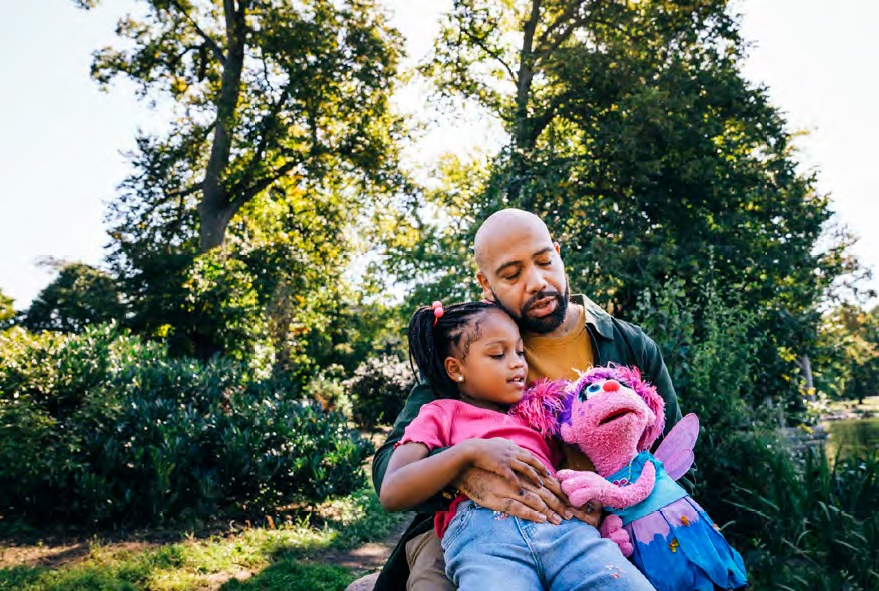
Children’s Mental Health and Emotional Well-Being FAQ
Learn more about children’s mental health needs and Sesame Workshop’s Emotional Well-Being initiative.
- Home
- Our Work
- What We Do
- Emotional Well-Being
- Children’s Mental Health and Emotional Well-Being FAQ
Frequently Asked Questions
What is the definition of children’s mental health and emotional well-being?
Simply put, children’s mental health and emotional well-being is how children think and feel about themselves and the experiences they encounter as they interact with the world around them.
Fostering emotional well-being at an early age can lay the foundation for positive outcomes later in life. Children who are mentally healthy tend to show greater motivation to learn, have a more positive attitude about themselves and the world, and demonstrate higher academic performance.
Is there a children’s mental health crisis in the United States?
Yes. In October 2021, the American Academy of Pediatrics, the American Academy of Child and Adolescent Psychiatry, and the Children’s Hospital Association declared a national emergency in children’s mental health1.
Prior to the pandemic, 1 in 5 children was diagnosed with a mental health disorder, but only 20% received follow-up care.2 The number of children diagnosed grew by 24% in 20203.
Recent research suggests that childhood (ages 3 to 17) depression and anxiety doubled during the first year of the COVID-19 pandemic4.
The youngest children are often overlooked in discussions about mental health – but there is growing evidence that young children are struggling, now more than ever.
Many young children have missed out on opportunities to build emotion awareness, including recognizing the physical cues of different emotions, labeling emotions with feeling words, identifying and practicing self-regulation strategies, and feeling comfortable with expressing emotions. With greater emotion awareness, children will better understand their emotions and build their skills in recognizing the emotions of others.
When it comes to their mental health and emotional well-being, what kinds of things do children need?
Children need a healthy mental state to flourish, feel and give love, experience joy, and develop positive social, emotional, and physical skills and a compassionate mindset. For young children, emotional well-being is connected to:
- Learning it’s okay to not be “perfect,” it’s valid to experience a broad range of emotions (including anger), and that it’s okay to ask for help.
- Understanding how their thoughts and feelings can affect their bodies.
- Supporting their positive experiences with their thoughts, feelings, and relationships in different cultures and settings.
- Feeling a sense of comfort, especially when receiving support from mental health professionals, and knowing that many other children need the same kind of support.
What can affect a child’s mental health?
There are many factors that affect a child’s mental health, and parents and caregivers play a key role.
Early childhood is a critical time for a child’s healthy development—that’s where these resources come in. During the first five years of life, a child’s brain develops faster than at any other point. It’s also when children begin to develop their sense of self and their ability to identify, express, and manage their emotions, a crucial building block for long-term emotional health and well-being.
Children who are mentally healthy tend to show greater motivation to learn, have a more positive attitude about themselves and the world, and demonstrate higher academic performance.
Childhood depression and anxiety doubled
during the first year of the COVID-19 pandemic. *(ages 3 to 17)
Why is Sesame Workshop addressing children’s mental health and emotional well-being?
At Sesame Workshop, we focus on the early years because it’s when we can lay the foundation for children’s future success in school and life. While we’ve long focused on children’s emotional well-being, we’re redoubling our efforts to address in an explicit way the full spectrum of what children need to flourish.
We convened expert advisors to better understand the scope of the issue. We also brought together caregivers, educators, and community providers to learn about the challenges they’re witnessing and, together, to envision the resources they need to support children’s emotional well-being.
We’re taking our learnings and developing new content that addresses children’s mental health – and we’ll use our beloved characters to make this topic approachable in the way that only Sesame can.
Our initiative provides an understanding of best developmental practices and offers children strategies they can practice themselves to develop their social, emotional, and physical well-being with the support of a nurturing adult.
It also provides parents, caregivers, and other influential service providers ways to support children’s mental health well-being and reach out for help when necessary.
What resources are available that can help me support my child’s mental health and emotional well-being?
Sesame Workshop is supporting the emotional well-being of young children and families through research-based resources and engaging content designed for the whole family.
Our approach offers strategies to support all families – from celebrating joyful everyday moments, to teaching children the essential skills they need to understand and manage their feelings, to helping parents and community providers recognize the signs of mental health challenges.
By equipping the caring adults in children’s lives with the tools needed to nurture emotional well-being, we’re building a circle of care around every child to help them cope with challenges big and small.
To best support your child’s mental health and well-being, parents and caregivers should:
- Create environments of calm and peace that promote positive childhood experiences and a sense of safety.
- Help children, including those in need of extra support, explore feelings to develop their ability to trust and to feel confident when facing new challenges.
- Motivate children with a positive mindset that provides hope for their future and in their own lives.
- Learn about signs of concern, or warning signals, that children may be in distress. Know when to “watch and wait” and when to reach out for help. Examples of warning signs include excessive clinginess, new phobias, or frequent stomachaches.
- Develop strategies for talking to children about mental health distress and the people who can help them (“feeling doctors”) in a way that normalizes the need for help and allows your child to feel more comfortable working with providers.
How do I talk to my child about mental health and emotional well-being?
While there is no one-size-fits-all approach to talking to your child about their mental health and emotional well-being, a good place to start is by ensuring your child feels as safe and protected as possible within your circumstances.
- Check in. Ask your child regularly how they’re feeling and help them label their emotions. Check in with yourself about how you’re feeling too.
- Use more feeling words. Everyday moments are the perfect way to use emotional vocabulary time and time again. Think of all the different types of emotions we feel every day! Say them out loud so your child can hear and see them in action.
- You’re here to listen. Let your child know that it’s good to share their feelings and thoughts with you and that you’re here to listen and help. Explain that all their feelings exist for a reason.
- I notice, I feel, I can. Model the “I notice, I feel, I can” strategy when your own big feelings arise. Talk through each step as you go so your child can see the strategy in action and begin to internalize it.
- You need emotional care and compassion too. Children’s emotional well-being starts with their parents and caregivers. It’s important to recognize your own emotional state as you help your child regulate theirs – and to model self-regulation for them. Being aware of your own triggers and taking care of yourself can help you best take care of your child.
- AAP News (2021). AAP, AACAP, CHA declare national emergency in children’s mental health Retrieved January 20, 2023 from https://publications.aap.org/aapnews/news/17718?autologincheck=redirected.
- DC. (2021). Children’s Mental Health: Improving Access to Children’s Mental Health Care. Retrieved January 20, 2023 from https://www.cdc.gov/childrensmentalhealth/access.html
- Hoffmann JA, Duffy SJ. Supporting youth mental health during the COVID- 19 pandemic. Acad Emerg Med. 2021;28:1485– 1487. doi:10.1111/acem.14398
- Slomski A. Pediatric Depression and Anxiety Doubled During the Pandemic. JAMA. 2021;326(13):1246. doi:10.1001/jama.2021.16374

